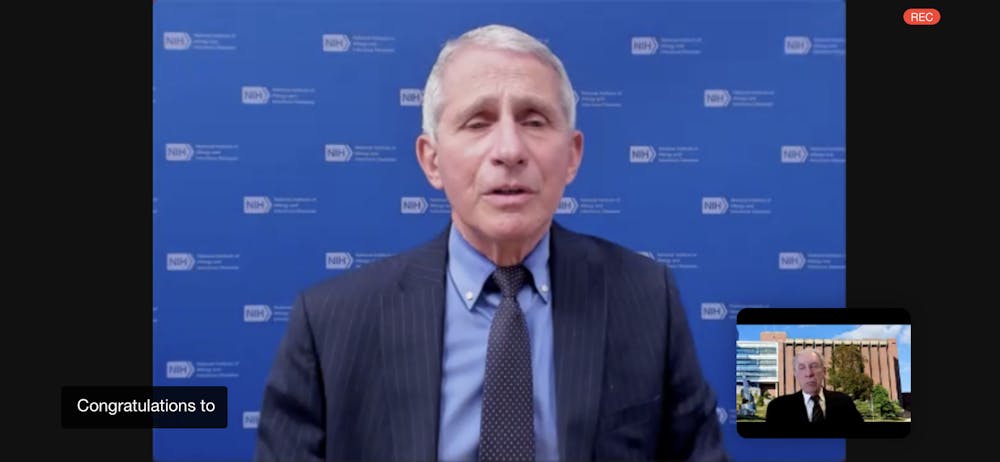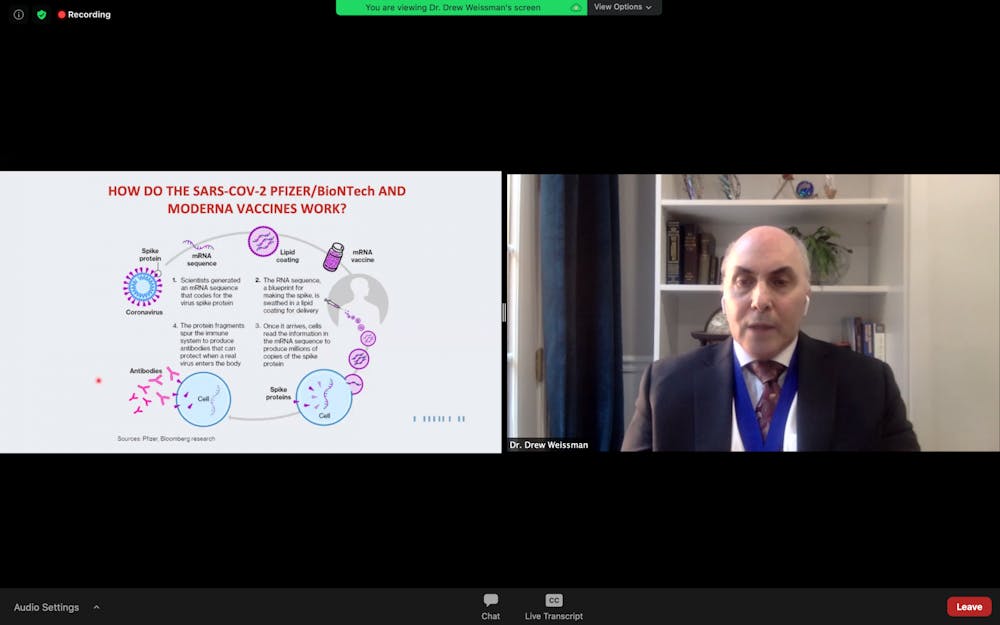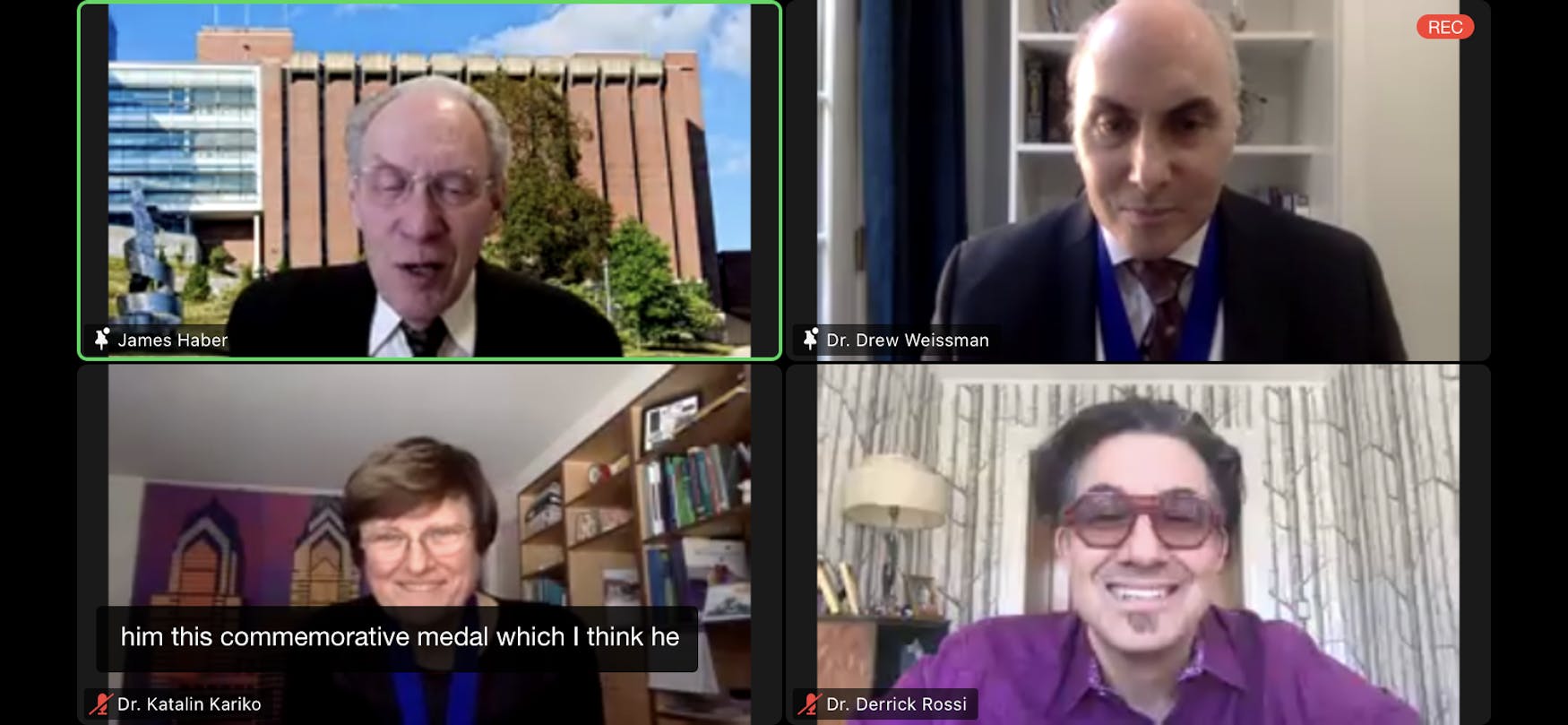Dr. Katalin Karikó and Prof. Drew Weissman receive the Lewis S. Rosenstiel Award for their work on mRNA vaccines against Sars-cov-2
Karikó and Weissman published their first study on the role of mRNA in the human immune response in 2005
University President Ron Leibowitz presented the Lewis S. Rosenstiel award to biochemist Dr. Katalin Karikó, senior vice president of BioNTech RNA Pharmaceuticals, and Prof. Drew Weissman ’81, MA ’81, Ph.D. ’15, professor of medicine at the University of Pennsylvania and director of Vaccine Research Infectious Diseases Division, for their discoveries in RNA therapeutics and vaccines. Dr. Anthony Fauci, Director of the National Institute of Allergy and Infectious Diseases and Chief Medical Advisor in the Biden Administration, and Dr. Derrick Rossi, co-founder of Moderna, both gave addresses at the award ceremony, which took place on Feb. 8.

Dr. Anthony Fauci, Director of the National Institute of Allergy and Infectious Diseases and Chief Medical Advisor in the Biden Administration attended the ceremony over Zoom and shared his enthusiasm for new therapeutic techniques.
To begin the virtual award ceremony, Professor James Haber (BIOL) gave the audience an overview of the basics of DNA and RNA and then introduced Dr. Derrick Rossi, the co-founder of Moderna. Moderna is an American biotechnology company focused on mRNA (messenger RNA)-based vaccine technologies, which has been made possible due to Karikó and Weissman's findings. It is one of the two companies that has their COVID-19 vaccine approved by the Food and Drug Administration. Rossi described the importance of DNA and proteins in human bodies. DNA stores instructions in the nucleus which are then transcribed to mRNA and finally translated into proteins, which are responsible for performing functions required by all cells. Rossi referred to DNA, mRNA and proteins as the "trifecta of life," saying, “DNA makes mRNA makes protein makes life.”
Prior to the COVID-19 pandemic, most people outside biology or related professions were not familiar with mRNA, but in 2020, it started to gain fame because of the use of mRNA to create the COVID-19 vaccine. Rossi thanked Karikó and Weissman “on behalf of all of humanity for their fundamental discovery in mRNA research.”
After Rossi’s address, Karikó and Weissman spoke. The scientists told the audience that they met at the University of Pennsylvania and began to work together due to their common interest in developing vaccines. In 2005, they published their landmark study testing the role of RNA chemical modifications on immunity. They discovered that when certain naturally occurring modified nucleosides are incorporated into RNA, the cells could have an immune response, explained Rossi.

The Sars-cov-2 vaccines are the first to use mRNA to elicit an immune response.
Weissman gave a general overview of vaccines, including their creations and effects. Most vaccines are made from inactivated, or weakened, versions of the virus they are designed to combat, as opposed to mRNA-based vaccines, which use a different approach. The mRNA vaccine teaches cells how to make a protein that triggers an immune response, which produces antibodies, but does not contain any of the original virus. The COVID-19 vaccine is the first mRNA vaccine to succeed in producing antibodies against a virus.
RNA was discovered 60 years ago and Karikó said it has taken over 20 years for scientists to synthesize and analyze mRNA. In the 1990s, Karikó was interested in making mRNA for medications and worked with Weissman to determine whether the nucleoside RNA was immunogenic, able to produce an immune response or not. Karikó thanked her family and all the scientists that came before her for their research and findings.
Weissman also explained the benefits of RNA-based vaccines: “Production is simple and can be scaled up, and most importantly they are safe.”
At the end of his presentation, Weissman shared a study that showed almost 95% efficacy a week after people received the second dose of the SARS-CoV-2 vaccination. As of today, the vaccine has been given to over 20 million people and only has unexpected reactions in about five per one million people (which is slightly higher than other vaccines). He emphasized that the vaccine does not change, alter or damage chromosomal DNA and the vaccine does not activate autoimmune diseases.
Chief Medical Adviser in the Biden Administration Dr. Anthony Fauci congratulated the recipients for “making fundamental advances in basic research that underpins extraordinary progress in real-world medicine.” He also expressed his optimism about the hope given to the world by the creation of mRNA based vaccines and therapeutics.



Please note All comments are eligible for publication in The Justice.